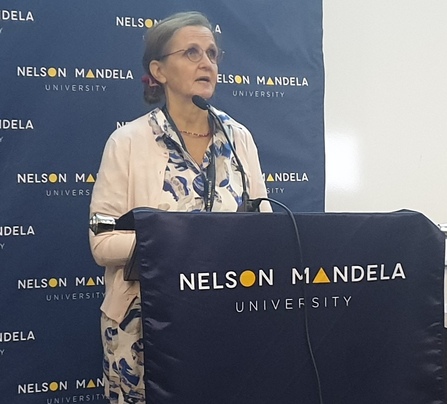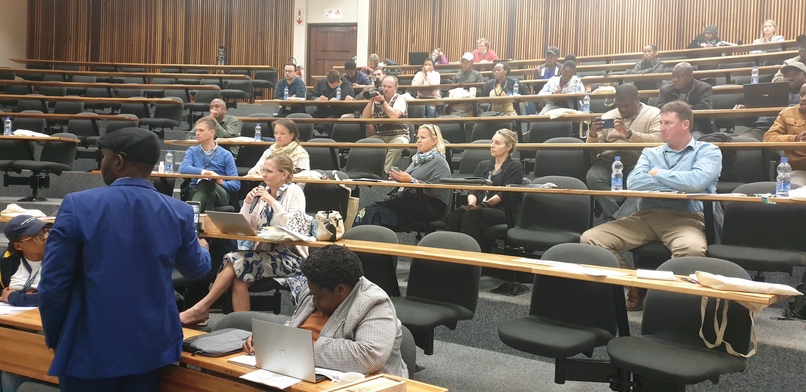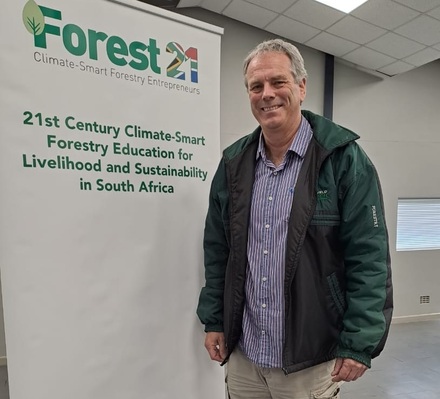Video
GEORGE NEWS & VIDEO - A four-day Forest21 symposium at Nelson Mandela University (NMU) George Campus this week is investigating ways in which forestry education and training can be adapted to equip future leaders, employees and entrepreneurs in the forestry industry to tackle the challenges of climate change.
The objective is to establish sustainable forestry practices and businesses that consider their impacts on the environment.
Forest21 is a European Union funded project aimed at strengthening South Africa's higher education programmes in forestry.
The partners are NMU, Venda University, Fort Cox, University of Stellenbosch, and Tshwane University of Technology from South Africa, Aalto University and Häme University of Applied Sciences from Finland, and Inland Norway University of Applied Sciences.
These institutions as well as various stakeholders in the forestry industry, including Sappi and the Institute for Commercial Forestry Research, are represented at the symposium that will conclude on Thursday.
During Monday's workshop, the effects of climate change in the different contexts of South Africa and the Nordic countries were highlighted.
In his introduction Prof Jos Louw, director of the NMU School of Natural Resource Management, said forestry is very sensitive to climate change, but is, together with agriculture, a custodian of vast tracks of land.
Both these industries have the potential to play an important role in mitigating the impacts of climate change through carbon sequestration and creating climate-smart, resilient production landscapes.
"Many new entrepreneurial opportunities will arise [from this] and hopefully this will contribute to the development of new business models in support of the green economy.
That will give us as academics pointers with regard to how we must change our curriculum, but more importantly, how we must change our learning and teaching techniques and programmes to make them more relevant to students ... [to] become part of the modern economy, playing a very significant role in how we can adapt to a changing environment."
VIDEO: Forestry education in context of climate change
 Dr Eija Laitinen of Häme University in Finland.
Dr Eija Laitinen of Häme University in Finland.
160 000 jobs supplied by forestry
Dr Nuveshen Naidoo, senior scientist from the Institute for Commercial Forestry Research, said the South African forestry industry supplies some 160 000 jobs and earns R25-billion in exports. It makes up 1% of South Africa's GDP.
He warned that climate change models predict hotter and drier weather. It will lead to declining yields in forestry as a result of increased stress on plantations, increased pest and disease incidence and fire risk.
New models for forestry production should be adopted faster and a diversity of genes of tree species must be conserved to ensure a "toolbox" that can be accessed in a changing environment.
Different species could be matched to different, best-suited areas for more resilience.
 The Forest21 symposium was hosted by Nelson Mandela University George Campus. Photos: Alida de Beer
The Forest21 symposium was hosted by Nelson Mandela University George Campus. Photos: Alida de Beer
Forestry's impacts on environment
Louise van Wyk, area environmental manager of Sappi, said the forestry industry affects water, soil and biodiversity, three "dependencies" of a healthy eco-system. Most stakeholder complaints they receive are centered around plantations reducing water availability in catchments.
Soil is affected through sedimentation landing in streams as a result of roads, harvesting and residue maintenance. The effects on biodiversity are not all clear and need further study.
"We need to break away from thinking that as an industry we can limit our thinking to what is applicable to forestry. We can start with operational specific projects but we need to find solutions for sustainable resource management and so safeguard opportunities, especially when we start looking at ecosystem-based adaptation."
Finland to share hard-earned knowledge
Dr Eija Laitinen of Häme University said Finland is in the position to transfer hard-earned knowledge to South Africa's forestry industry and educational institutions. Seventy percent of her country is covered in forests and the industry there is centuries old.
Forestry education started in the 1860s. Forests are their only natural resource and ethical entrepreneurship in forestry is vital.
"It is not for money. It is for jobs and wealth in an ethical way. My grandfather planted for me, and I am planting for my grandchildren. So the lifespan of those trees from where our wealth and jobs come, is three generations."
 Prof Jos Louw, director of the Nelson Mandela School of Natural Resource Management. Photo: Dr Tatenda Mapeto
Prof Jos Louw, director of the Nelson Mandela School of Natural Resource Management. Photo: Dr Tatenda Mapeto
Ability to react to rapid change
Romi Rancken, forestry expert of Häme University, warned that the forestry industry must be prepared for anything and must be able to react to rapid change. In Finland, the industry has recently been greatly affected by the Russia-Ukraine war in that the electricity price has increased tenfold and wood imports from Russia have come to a standstill.
Most forests in Finland are owned privately by businesses and individuals. The country has more than 1 000 small sawmills. Forests are open to the public for recreation, hunting and collecting mushrooms and berries.
'We bring you the latest George, Garden Route news'
















